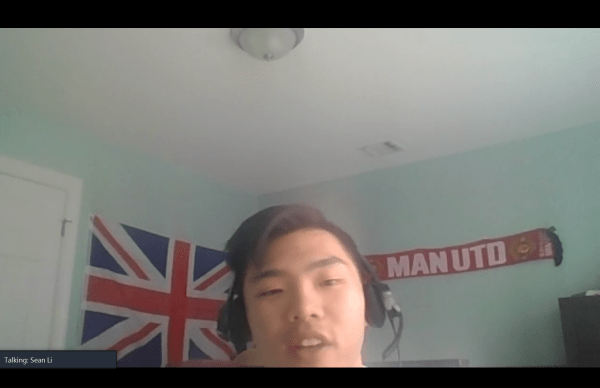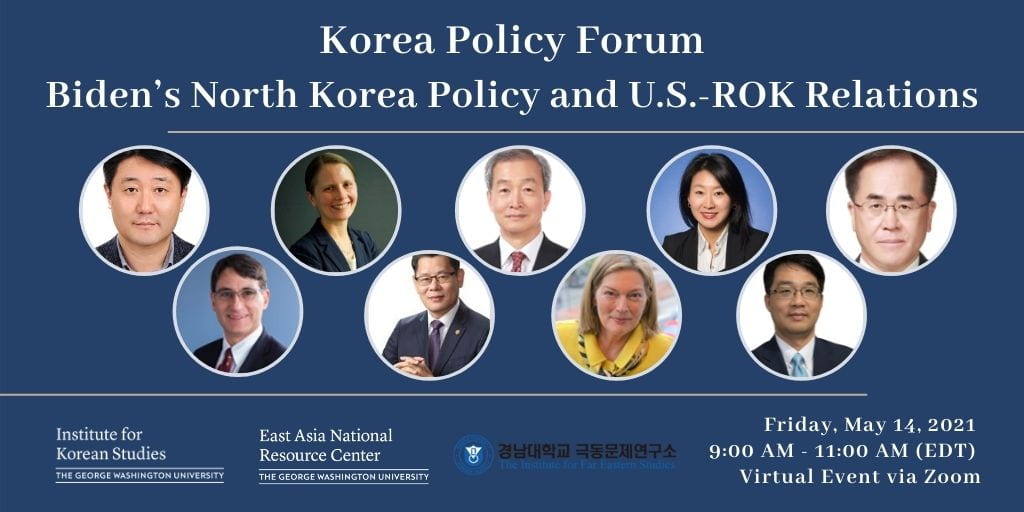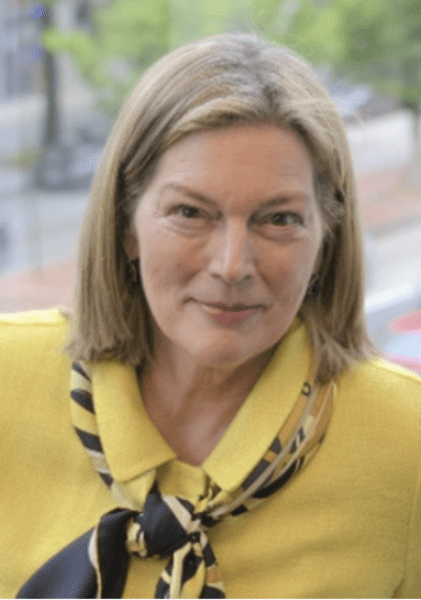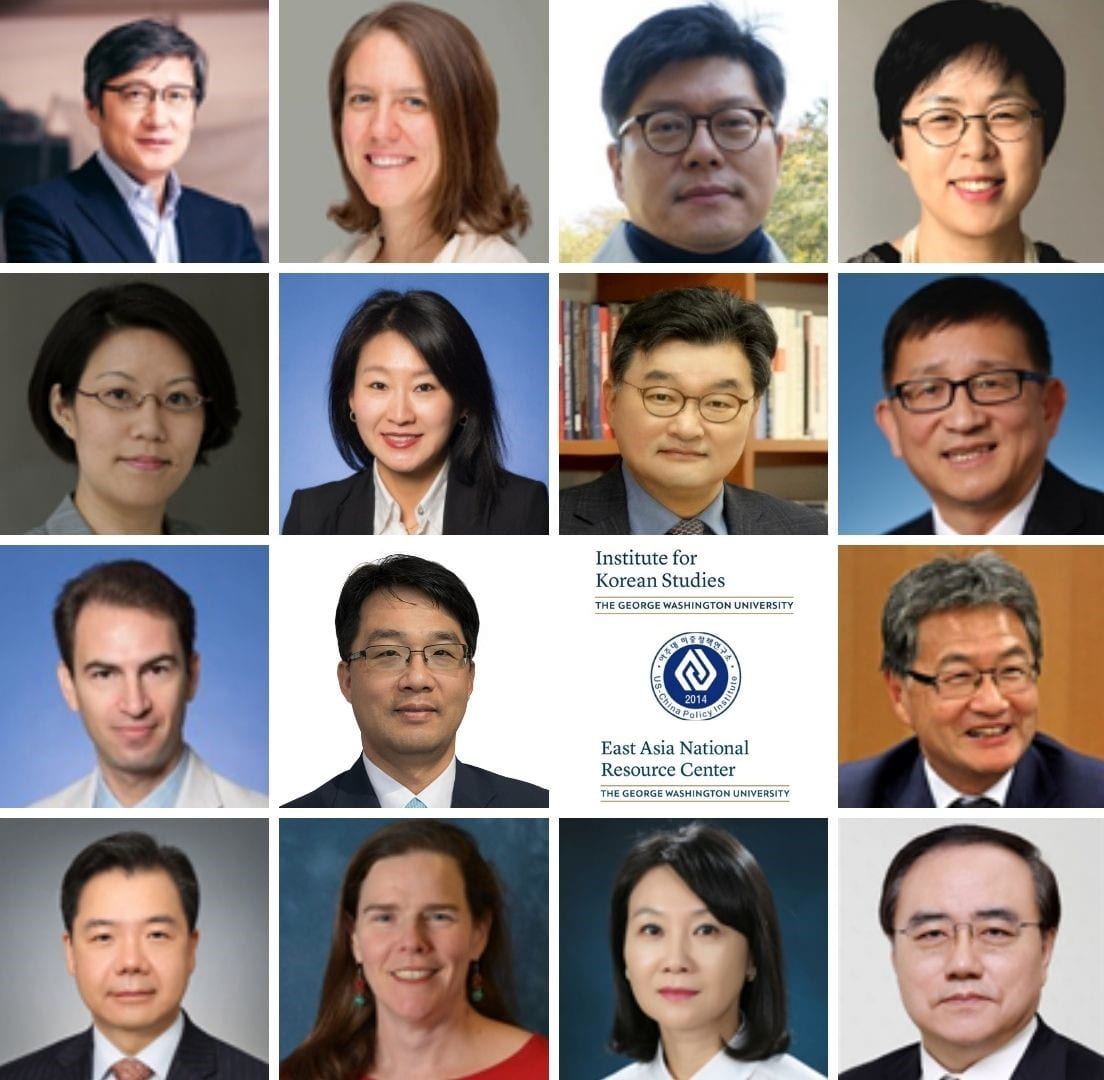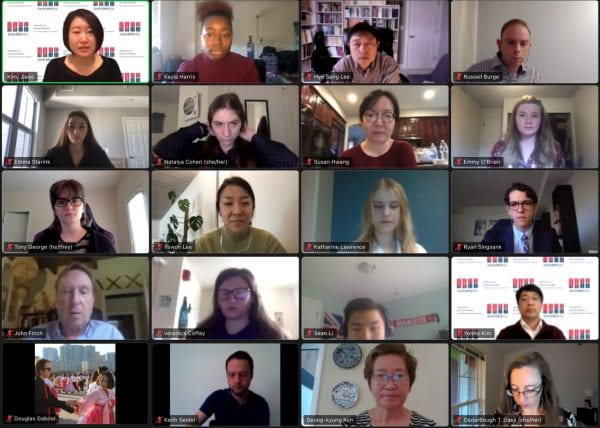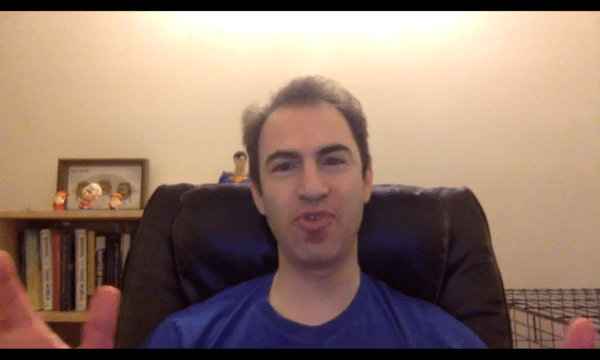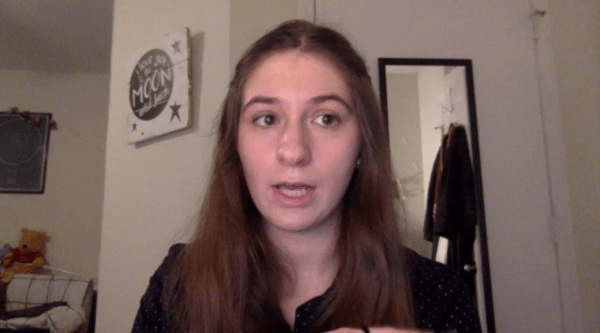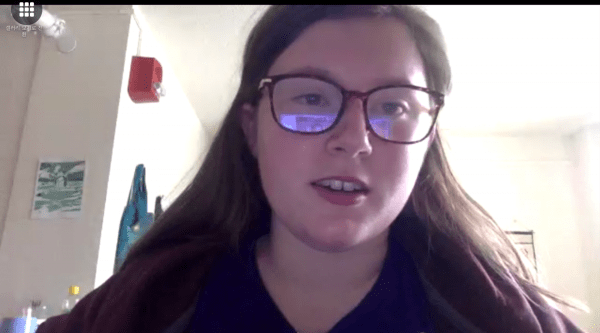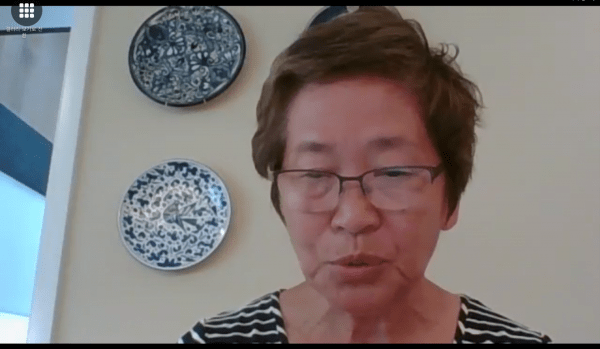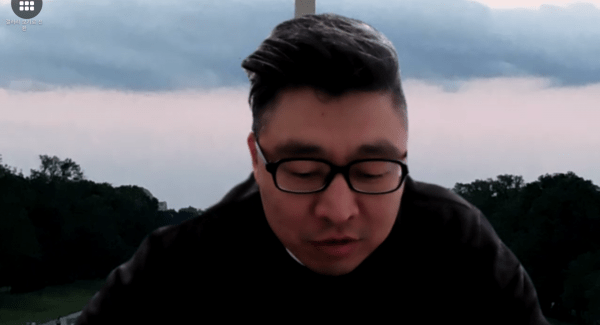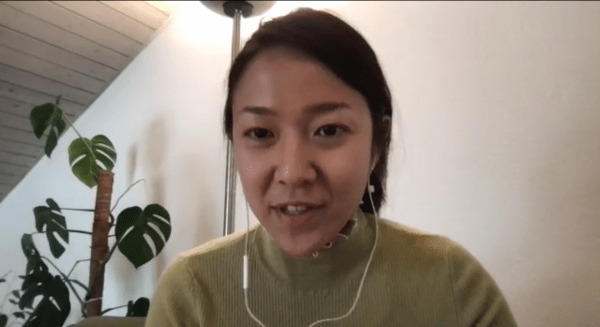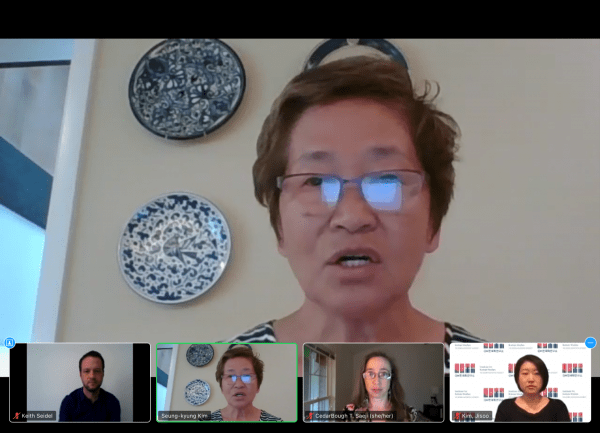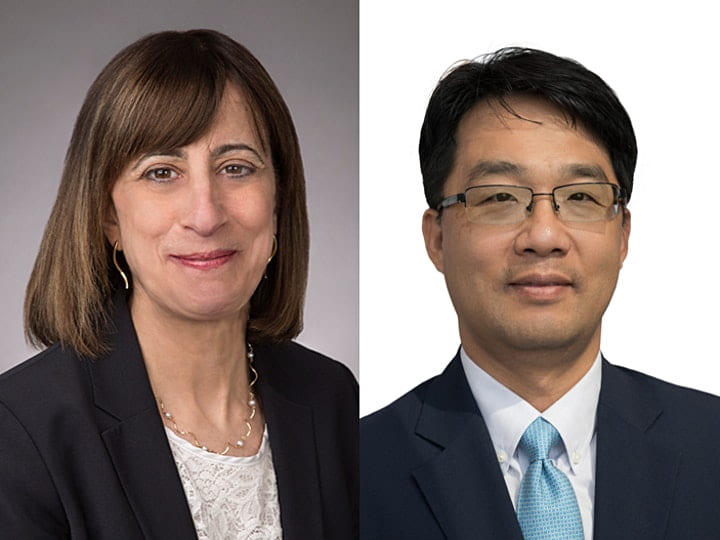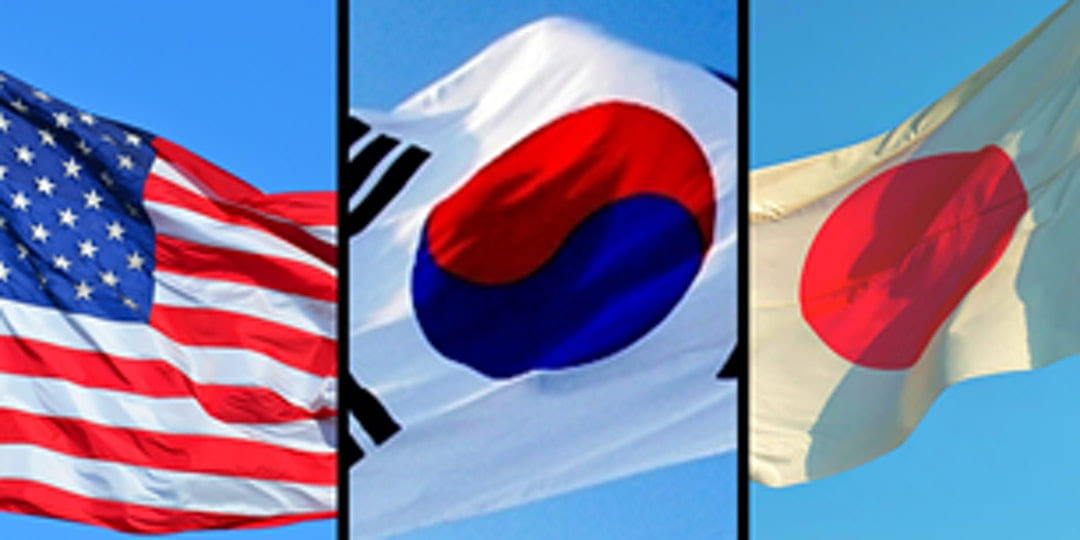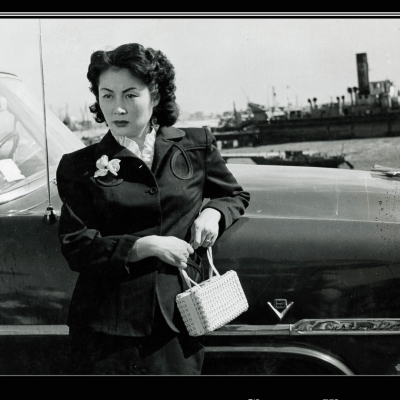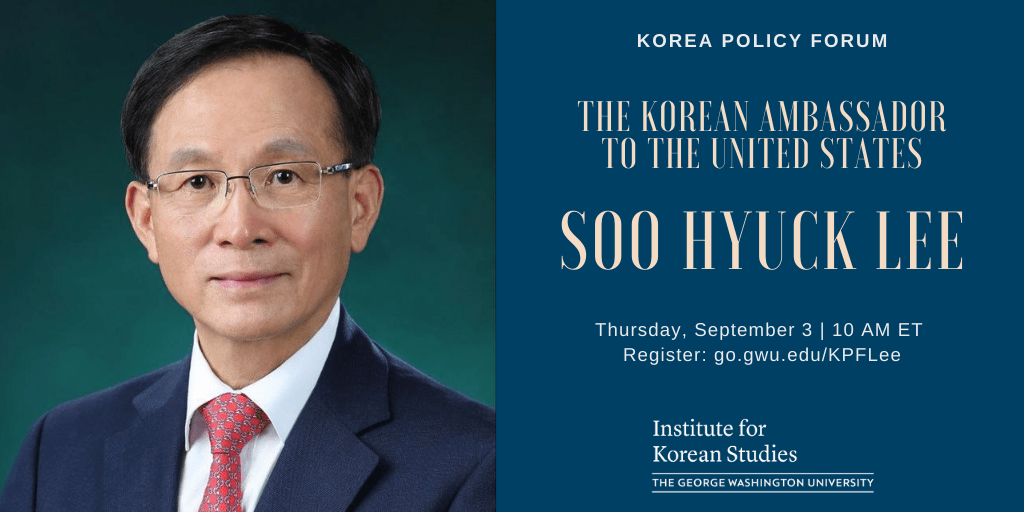Category: Archived Events
5/14 Korea Policy Forum, Biden’s North Korea Policy and U.S.-ROK Relations
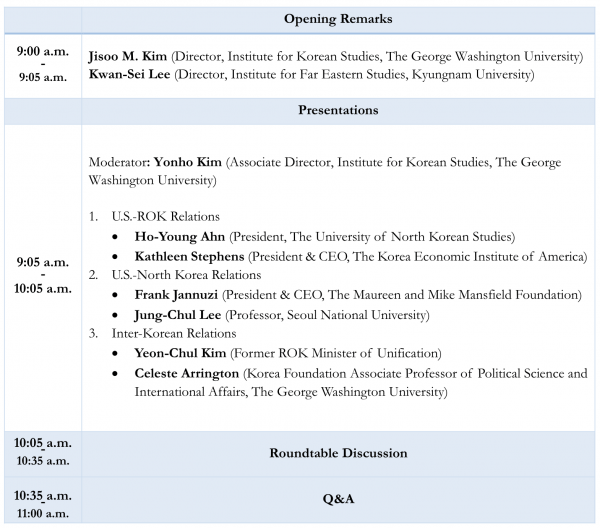
Korea Policy Forum
Friday, May 14, 2021
9:00 AM – 11:00 AM EDT
Virtual Event
This event is on the record and open to the public.
The event will be recorded and made available on GWIKS’ YouTube channel.
Event Description
President Joe Biden affirmed his intention to work closely with U.S. allies to address threats from North Korea through diplomacy and deterrence in his first address to a joint session of Congress. On the third anniversary of the signing of the Panmunjom Declaration with North Korean leader Kim Jung-Un, President Moon Jae-In urged for a resumption of the otherwise stalled Korean peninsula peace process, including restoring the inter-Korean dialogue. The upcoming U.S.-ROK summit on May 21 may represent a key milestone in the development of a new coordinated approach between the United States and South Korea to address issues related to North Korea. Please join the GW Institute for Korean Studies for an online discussion with experts who will be discussing views from the United States and South Korea on the Biden administration’s approach to the Korean peninsula and the state of U.S.-ROK relations.
Speakers
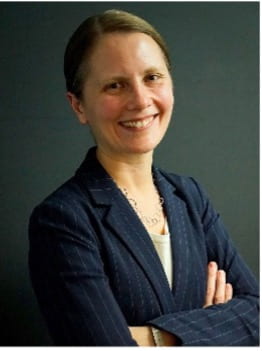 Celeste Arrington is Korea Foundation Associate Professor of Political Science and International Affairs at GW. She specializes in comparative politics, with a regional focus on the Koreas and Japan. Her research and teaching focus on law and social movements, the media, lawyers, policy processes, historical justice, North Korean human rights, and qualitative methods. She is also interested in the international relations and security of Northeast Asia and transnational activism. She is the author of Accidental Activists: Victim Movements and Governmental Accountability in Japan and South Korea (2016) and has published in Comparative Political Studies, Law & Society Review, Journal of East Asian Studies, Pacific Affairs, Asian Survey, and theWashington Post, among others. She received a Ph.D. from the University of California, Berkeley, an MPhil from the University of Cambridge, and an A.B. from Princeton University. She is currently writing a book that analyzes the role of lawyers and legal activism in Japanese and Korean policies related to persons with disabilities and tobacco control.
Celeste Arrington is Korea Foundation Associate Professor of Political Science and International Affairs at GW. She specializes in comparative politics, with a regional focus on the Koreas and Japan. Her research and teaching focus on law and social movements, the media, lawyers, policy processes, historical justice, North Korean human rights, and qualitative methods. She is also interested in the international relations and security of Northeast Asia and transnational activism. She is the author of Accidental Activists: Victim Movements and Governmental Accountability in Japan and South Korea (2016) and has published in Comparative Political Studies, Law & Society Review, Journal of East Asian Studies, Pacific Affairs, Asian Survey, and theWashington Post, among others. She received a Ph.D. from the University of California, Berkeley, an MPhil from the University of Cambridge, and an A.B. from Princeton University. She is currently writing a book that analyzes the role of lawyers and legal activism in Japanese and Korean policies related to persons with disabilities and tobacco control.
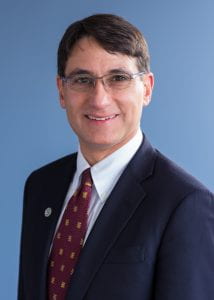 Frank Jannuzi joined the Mansfield Foundation as President and Chief Executive Officer in April 2014. He previously served as Deputy Executive Director (Advocacy, Policy and Research) at Amnesty International, USA. There he shaped and promoted legislation and policies to advance universal human rights, protect individuals and communities at risk, and free prisoners of conscience. From 1997-2012 Mr. Jannuzi was Policy Director, East Asian and Pacific Affairs, for the U.S. Senate Foreign Relations Committee, where he advised Committee Chairmen Joseph Biden and John Kerry on a range of security, political, economic, and human rights issues pertinent to U.S. relations with East Asia. During his tenure with the Foreign Relations Committee he also was a Hitachi Fellow of the Council on Foreign Relations from 2006-2007, serving as a visiting lecturer at Keio University and a visiting scholar at the Institute of International Policy Studies in Tokyo. Early in his career he served for nine years as an analyst in the U.S. Department of State’s Bureau of Intelligence and Research. Mr. Jannuzi holds a Bachelor of Arts degree from Yale University and Master in Public Policy degree from the John F. Kennedy School of Government, Harvard University. He has traveled throughout Asia and has written extensively on East Asia policy issues, including U.S. relations with Japan, China, and North Korea.
Frank Jannuzi joined the Mansfield Foundation as President and Chief Executive Officer in April 2014. He previously served as Deputy Executive Director (Advocacy, Policy and Research) at Amnesty International, USA. There he shaped and promoted legislation and policies to advance universal human rights, protect individuals and communities at risk, and free prisoners of conscience. From 1997-2012 Mr. Jannuzi was Policy Director, East Asian and Pacific Affairs, for the U.S. Senate Foreign Relations Committee, where he advised Committee Chairmen Joseph Biden and John Kerry on a range of security, political, economic, and human rights issues pertinent to U.S. relations with East Asia. During his tenure with the Foreign Relations Committee he also was a Hitachi Fellow of the Council on Foreign Relations from 2006-2007, serving as a visiting lecturer at Keio University and a visiting scholar at the Institute of International Policy Studies in Tokyo. Early in his career he served for nine years as an analyst in the U.S. Department of State’s Bureau of Intelligence and Research. Mr. Jannuzi holds a Bachelor of Arts degree from Yale University and Master in Public Policy degree from the John F. Kennedy School of Government, Harvard University. He has traveled throughout Asia and has written extensively on East Asia policy issues, including U.S. relations with Japan, China, and North Korea.
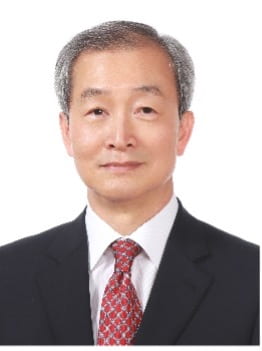 Ho-Young Ahn is the President of the University of North Korean Studies, a premier institution for research and education on North Korea related issues. Ambassador Ahn served as the Republic of Korea’s Ambassador to the United States (2013-17), Deputy Minister for Trade at the Ministry of Foreign Affairs, Ambassador to the European Union and Belgium, and the First Vice Foreign Minister. Ambassador Ahn studied international relations and law at Seoul National University (BA), Georgetown University (MS), Korea National Open University (LLB) and the Georgetown Law School (LLM). He received a Ph.D degree (Hon) in political science from Kyung-Nam University.
Ho-Young Ahn is the President of the University of North Korean Studies, a premier institution for research and education on North Korea related issues. Ambassador Ahn served as the Republic of Korea’s Ambassador to the United States (2013-17), Deputy Minister for Trade at the Ministry of Foreign Affairs, Ambassador to the European Union and Belgium, and the First Vice Foreign Minister. Ambassador Ahn studied international relations and law at Seoul National University (BA), Georgetown University (MS), Korea National Open University (LLB) and the Georgetown Law School (LLM). He received a Ph.D degree (Hon) in political science from Kyung-Nam University.
 Jisoo M. Kim is Korea Foundation Associate Professor of History, International Affairs, and East Asian Languages and Literatures. She currently serves as the Director of the Institute for Korean Studies and the Co-Director of the East Asia National Resource Center at GW. She also serves as the Editor-in-Chief of the Journal of Korean Studies. She is a specialist in gender, law, and emotions in Korean history. Her broader research interests include gender and sexuality, crime and justice, forensic medicine, literary representations of the law, history of emotions, vernacular, and gender writing. She is the author of The Emotions of Justice: Gender, Status, and Legal Performance in Chosŏn Korea (University of Washington Press, 2015), which was awarded the 2017 James Palais Prize of the Association for Asian Studies. She is also the co-editor of The Great East Asian War and the Birth of the Korean Nation by JaHyun Kim Haboush (Columbia University Press, 2016). She is currently working on a book project tentatively entitled Sexual Desire, Crime, and Gendered Subjects: A History of Adultery Law in Korea. She received her M.A., M.Phil., and Ph.D. in East Asian Languages and Cultures from Columbia University.
Jisoo M. Kim is Korea Foundation Associate Professor of History, International Affairs, and East Asian Languages and Literatures. She currently serves as the Director of the Institute for Korean Studies and the Co-Director of the East Asia National Resource Center at GW. She also serves as the Editor-in-Chief of the Journal of Korean Studies. She is a specialist in gender, law, and emotions in Korean history. Her broader research interests include gender and sexuality, crime and justice, forensic medicine, literary representations of the law, history of emotions, vernacular, and gender writing. She is the author of The Emotions of Justice: Gender, Status, and Legal Performance in Chosŏn Korea (University of Washington Press, 2015), which was awarded the 2017 James Palais Prize of the Association for Asian Studies. She is also the co-editor of The Great East Asian War and the Birth of the Korean Nation by JaHyun Kim Haboush (Columbia University Press, 2016). She is currently working on a book project tentatively entitled Sexual Desire, Crime, and Gendered Subjects: A History of Adultery Law in Korea. She received her M.A., M.Phil., and Ph.D. in East Asian Languages and Cultures from Columbia University.
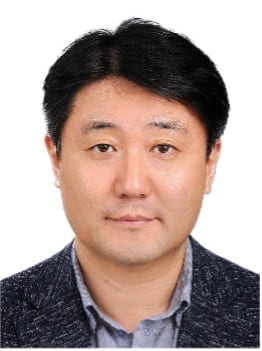 Jung-Chul Lee is a Professor in the Department of Political Science and International Relations at Seoul National University. He was a Professor in the Department of Political Science and International Relations at Soongsil University (2006-2021) and the Chief of Economic Security Research Team at the Samsung Economic Research Institute (2002-2006). In 2014 he served as a visiting scholar at the George Washington University’s Sigur Center for Asian Studies. He has written many books and articles on North Korea, including “Sanctions for Nuclear Inhibition: Comparing Sanction Conditions between Iran and North Korea”(Asian Perspective, 2019), “Costly Signals, Failed Deterrence and a New Alternative”(Legislative Studies in Korean, 2017), “Obama Doctrine and US Policy towards North Korea: Geopolitics, Nuclear Strategy, and Value iplomacy,” (Journal of Korean Politics in Korean, 2016) and “Making Sense of North Korea: How to Respond to Pyongyang’s Charm Offensive,”(Foreign Affairs, 2015). He holds a Bachelor of Laws degree (1991) from Seoul National University and an M.A. (1997) in Political Science from Seoul National University. He completed his Ph.D. in Political Science at Seoul National University in 2002.
Jung-Chul Lee is a Professor in the Department of Political Science and International Relations at Seoul National University. He was a Professor in the Department of Political Science and International Relations at Soongsil University (2006-2021) and the Chief of Economic Security Research Team at the Samsung Economic Research Institute (2002-2006). In 2014 he served as a visiting scholar at the George Washington University’s Sigur Center for Asian Studies. He has written many books and articles on North Korea, including “Sanctions for Nuclear Inhibition: Comparing Sanction Conditions between Iran and North Korea”(Asian Perspective, 2019), “Costly Signals, Failed Deterrence and a New Alternative”(Legislative Studies in Korean, 2017), “Obama Doctrine and US Policy towards North Korea: Geopolitics, Nuclear Strategy, and Value iplomacy,” (Journal of Korean Politics in Korean, 2016) and “Making Sense of North Korea: How to Respond to Pyongyang’s Charm Offensive,”(Foreign Affairs, 2015). He holds a Bachelor of Laws degree (1991) from Seoul National University and an M.A. (1997) in Political Science from Seoul National University. He completed his Ph.D. in Political Science at Seoul National University in 2002.
Kathleen Stephens is the President and CEO of the Korea Economic Institute of America (KEI). A former U.S. Foreign Service Officer, she served as U.S. Ambassador to the Republic of Korea from 2008 to 2011. Her other overseas assignments included postings to China, former Yugoslavia, Portugal, Northern Ireland, where she was U.S. Consul General in Belfast during the negotiations culminating in the 1998 Good Friday Agreement, and India, where she was U.S. Charge ‘d Affaires (2014-2015). Ambassador Stephens also served in a number of policy positions in Washington at the Department of State and the White House. These included acting Under Secretary of State for Public Diplomacy and Public Affairs (2012), Principal Deputy Assistant Secretary of State for East Asian and Pacific Affairs (2005-2007), Deputy Assistant Secretary of State for European and Eurasian Affairs (2003-2005), and National Security Council Director for European Affairs at the Clinton White House.
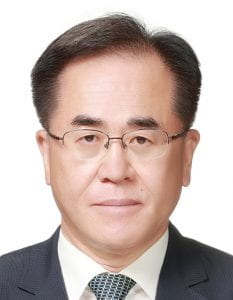 Kwan-sei Lee is the Director of the Institute for Far Eastern Studies at Kyungnam University. He has served in a number of positions at the ROK Ministry of Unification. These included the 17th Deputy Minister of Unification, Head of the Office of Inter-Korean Dialogue, Director General for Unification Policy, Head of the Intelligence and Analysis Bureau, and the Ministry’s spokesperson. He also served as a representative in the 18th, 19th, and 20th Inter-Korean Ministerial Talks, and was the head of the advance team for the Inter-Korean Summit. He is a member of various governmental advisory committees such as the Gaeseong Industrial District Management Foundation. He received his Ph. D. in North Korean Studies from the Graduate School of North Korean Studies at Kyungnam University.
Kwan-sei Lee is the Director of the Institute for Far Eastern Studies at Kyungnam University. He has served in a number of positions at the ROK Ministry of Unification. These included the 17th Deputy Minister of Unification, Head of the Office of Inter-Korean Dialogue, Director General for Unification Policy, Head of the Intelligence and Analysis Bureau, and the Ministry’s spokesperson. He also served as a representative in the 18th, 19th, and 20th Inter-Korean Ministerial Talks, and was the head of the advance team for the Inter-Korean Summit. He is a member of various governmental advisory committees such as the Gaeseong Industrial District Management Foundation. He received his Ph. D. in North Korean Studies from the Graduate School of North Korean Studies at Kyungnam University.
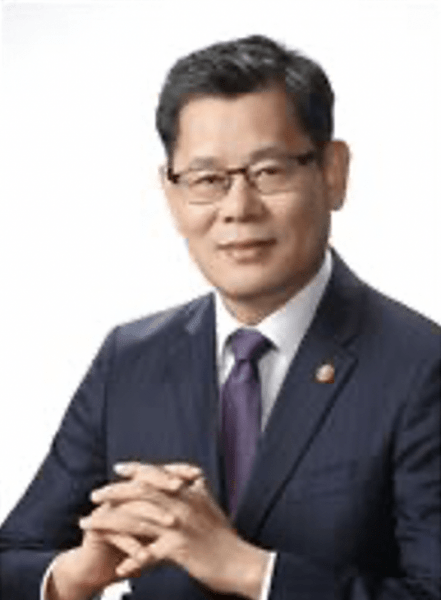 Yeon-Chul Kim is the Chairman of the Board of the Korea Peace Forum and a Professor of the Department of Korea Unification at Inje University. He served as the Republic of Korea’s Minister of Unification. Prior to that, he was the President of the Korea Institute for National Unification and served as a policy advisor to Minister of Unification. He worked as a Chief Researcher at Samsung Economic Research Institute and a research professor at the Asiatic Research Institute (ARI), Korea University. He is the author of Dialogue of the Past 70 Years: Re-evaluating the History of Inter-Korean Relations and The Strategy of Negotiation. He received his Ph.D. in Political Science from Sungkyunkwan University.
Yeon-Chul Kim is the Chairman of the Board of the Korea Peace Forum and a Professor of the Department of Korea Unification at Inje University. He served as the Republic of Korea’s Minister of Unification. Prior to that, he was the President of the Korea Institute for National Unification and served as a policy advisor to Minister of Unification. He worked as a Chief Researcher at Samsung Economic Research Institute and a research professor at the Asiatic Research Institute (ARI), Korea University. He is the author of Dialogue of the Past 70 Years: Re-evaluating the History of Inter-Korean Relations and The Strategy of Negotiation. He received his Ph.D. in Political Science from Sungkyunkwan University.
Moderator
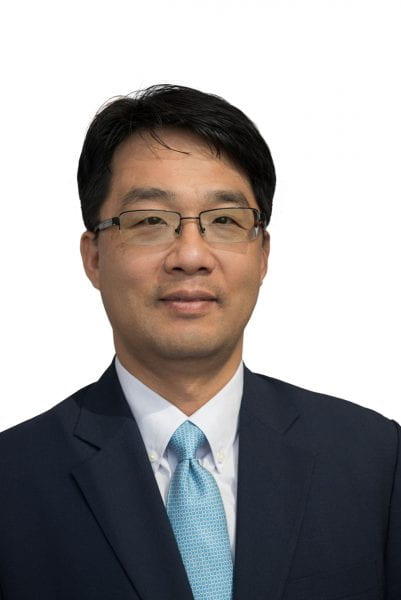 Yonho Kim is an Associate Research Professor of Practice and the Associate Director of GW Institute for Korean Studies. He specializes in North Korea’s mobile telecommunications and U.S. policy towards North Korea. Kim is the author of North Korean Phone Money: Airtime Transfers as a Precursor to Mobile Payment System (2020), North Korea’s Mobile Telecommunications and Private Transportation Services in the Kim Jong-un Era (2019) and Cell Phones in North Korea: Has North Korea Entered the Telecommunications Revolution? (2014). His research findings were covered by various media outlets, including Wall Street Journal, The Atlantic, Yonhap News, and Libération. Prior to joining GWIKS, he extensively interacted with the Washington policy circle on the Korean peninsula as Senior Researcher of the U.S.-Korea Institute at Johns Hopkins University School of Advanced International Studies, Senior Reporter for Voice of America’s Korean Service, and Assistant Director of the Atlantic Council’s Program on Korea in Transition. He holds a B.A. and M.A. in International Relations from Seoul National University, and an M.A. in International Relations and International Economics from Johns Hopkins University School of Advanced International Studies.
Yonho Kim is an Associate Research Professor of Practice and the Associate Director of GW Institute for Korean Studies. He specializes in North Korea’s mobile telecommunications and U.S. policy towards North Korea. Kim is the author of North Korean Phone Money: Airtime Transfers as a Precursor to Mobile Payment System (2020), North Korea’s Mobile Telecommunications and Private Transportation Services in the Kim Jong-un Era (2019) and Cell Phones in North Korea: Has North Korea Entered the Telecommunications Revolution? (2014). His research findings were covered by various media outlets, including Wall Street Journal, The Atlantic, Yonhap News, and Libération. Prior to joining GWIKS, he extensively interacted with the Washington policy circle on the Korean peninsula as Senior Researcher of the U.S.-Korea Institute at Johns Hopkins University School of Advanced International Studies, Senior Reporter for Voice of America’s Korean Service, and Assistant Director of the Atlantic Council’s Program on Korea in Transition. He holds a B.A. and M.A. in International Relations from Seoul National University, and an M.A. in International Relations and International Economics from Johns Hopkins University School of Advanced International Studies.
5/17 Korea Policy Forum, Multilateral Cooperation in Northeast Asia in the Biden Era
Multilateral Cooperation in Northeast Asia in the Biden Era
Monday, May 17, 2021
9:00 AM – 11:00 AM EDT
Virtual Event
This event is on the record and open to the public.
The event will be recorded and made available on GWIKS’ YouTube channel.
Event Description
President Joe Biden laid out his vision of leading the world with allies and friends while emphasizing the reality of intense competition with China on many fronts in his first address to a joint session of Congress. In this complex international landscape, the countries in Northeast Asia face common challenges—including pandemics, climate change, U.S.-China technology rivalry, decoupling of the US-China in the global ICT supply chains, North Korea’s nuclear problem—that cannot be dealt with by individual nations. The upcoming U.S.-ROK summit would shed a light on the pressing need for a cooperative approach to these challenges in the region. Please join the GW Institute for Korean Studies for an online discussion with experts who will be discussing views from the United States and South Korea on regional cooperation in Northeast Asia in the Biden era.
Speakers (Alphabetical Order)
United States
- Cheng Li (Director of the John L. Thornton China Center, Brookings Institution)
- Gregg Brazinsky (Deputy Director of Institute for Korean Studies, The George Washington University)
- Jane Nakano (Senior Fellow, Center for Strategic and International Studies)
- Joseph Yun (Senior Advisor, U.S. Institute of Peace)
- Kristin Vekasi (Associate Professor, The University of Maine)
- Mary Alice Haddad (John E. Andrus Professor of Government, Wesleyan University)
South Korea
- Chaesung Chun (Professor, Seoul National University)
- Jae-Seung Lee (Dean & Jean Monnet Chair, Graduate School of International Studies, Korea University)
- Shin-Wha Lee (Professor, Korea University)
- Sung-Han Kim (Director of Ilmin International Relations Institute, Korea University)
- Young Ja Bae (Professor, Konkuk University)
- Yul Sohn (President, East Asia Institute)
Program
Profiles (Alphabetical Order)
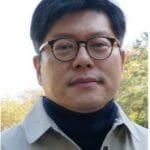 Chaesung Chun is a Professor in the Department of Political Science and International Relations at Seoul National University, teaching international relations theory and security studies. He is the Director of the National Security Center of the East Asian Institute. He is a member of the advisory committee for the Ministry of Foreign Affairs, the Ministry of Defense, and the Ministry of Unification. He was a visiting professor at Keio University in Tokyo from 2017-2018, and from 2010-2011. He was the Director of the Center for International Studies at Seoul National University. The books he has authored include: Sovereignty and International Relations: Northeast Asian International Relations Theory: Politics among Incomplete Sovereign States (2020), Sovereignty and International Relations: Modern Sovereign States System and the Evolution of the Empire (2019), East Asian International Relations (2011), and Is Politics Moral?: Reinhold Niebuhr’s Transcendental Realism (2012). He received his B.A. and M.A. from Seoul National University, and his Ph.D. from Northwestern University in the field of International Relations Theory.
Chaesung Chun is a Professor in the Department of Political Science and International Relations at Seoul National University, teaching international relations theory and security studies. He is the Director of the National Security Center of the East Asian Institute. He is a member of the advisory committee for the Ministry of Foreign Affairs, the Ministry of Defense, and the Ministry of Unification. He was a visiting professor at Keio University in Tokyo from 2017-2018, and from 2010-2011. He was the Director of the Center for International Studies at Seoul National University. The books he has authored include: Sovereignty and International Relations: Northeast Asian International Relations Theory: Politics among Incomplete Sovereign States (2020), Sovereignty and International Relations: Modern Sovereign States System and the Evolution of the Empire (2019), East Asian International Relations (2011), and Is Politics Moral?: Reinhold Niebuhr’s Transcendental Realism (2012). He received his B.A. and M.A. from Seoul National University, and his Ph.D. from Northwestern University in the field of International Relations Theory.
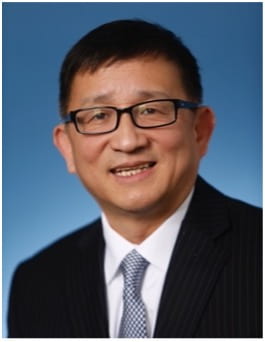 Cheng Li is Director and Senior Fellow at the Brookings Institution’s John L. Thornton China Center. Dr. Li is also a director of the National Committee on U.S.-China Relations, a Distinguished Fellow of the Munk School of Global Affairs and Public Policy at University of Toronto, a nonresident fellow at Yale University’s Paul Tsai China Center, and a member of the Council on Foreign Relations. Li’s research areas include the transformation of political leaders, generational change, the Chinese middle class, technological development in China, and U.S.-China relations. He is the author/editor of numerous books, including Rediscovering China: Dynamics and Dilemmas of Reform (1997), China’s Leaders: The New Generation (2001), Bridging Minds Across the Pacific: The Sino-US Educational Exchange (2005), China’s Changing Political Landscape (2008), China’s Emerging Middle Class (2010), China’s Political Development: Chinese and American Perspectives (2014), Chinese Politics in the Xi Jinping Era: Reassessing Collective Leadership (2016), The Power of Ideas: The Rising Influence of Thinkers and Think Tanks in China (2017), and Middle Class Shanghai: Reshaping U.S.-China Engagement (2021). He is currently completing a book manuscript with the working title Xi Jinping’s Protégés: Rising Elite Groups in the Chinese Leadership. He is the principal editor of the Thornton Center Chinese Thinkers Series published by the Brookings Institution Press. Dr. Li has advised a wide range of U.S. government, education, research, business and not-for-profit organizations on work in China. Dr. Li has frequently been called upon to share his unique perspective and insights as an expert on China. He recently appeared on BBC, CCTV, CNN, C-SPAN, ABC World News, NPR, and PBS. Li received an M.A. in Asian Studies from the University of California at Berkeley and a Ph.D. in Political Science from Princeton University.
Cheng Li is Director and Senior Fellow at the Brookings Institution’s John L. Thornton China Center. Dr. Li is also a director of the National Committee on U.S.-China Relations, a Distinguished Fellow of the Munk School of Global Affairs and Public Policy at University of Toronto, a nonresident fellow at Yale University’s Paul Tsai China Center, and a member of the Council on Foreign Relations. Li’s research areas include the transformation of political leaders, generational change, the Chinese middle class, technological development in China, and U.S.-China relations. He is the author/editor of numerous books, including Rediscovering China: Dynamics and Dilemmas of Reform (1997), China’s Leaders: The New Generation (2001), Bridging Minds Across the Pacific: The Sino-US Educational Exchange (2005), China’s Changing Political Landscape (2008), China’s Emerging Middle Class (2010), China’s Political Development: Chinese and American Perspectives (2014), Chinese Politics in the Xi Jinping Era: Reassessing Collective Leadership (2016), The Power of Ideas: The Rising Influence of Thinkers and Think Tanks in China (2017), and Middle Class Shanghai: Reshaping U.S.-China Engagement (2021). He is currently completing a book manuscript with the working title Xi Jinping’s Protégés: Rising Elite Groups in the Chinese Leadership. He is the principal editor of the Thornton Center Chinese Thinkers Series published by the Brookings Institution Press. Dr. Li has advised a wide range of U.S. government, education, research, business and not-for-profit organizations on work in China. Dr. Li has frequently been called upon to share his unique perspective and insights as an expert on China. He recently appeared on BBC, CCTV, CNN, C-SPAN, ABC World News, NPR, and PBS. Li received an M.A. in Asian Studies from the University of California at Berkeley and a Ph.D. in Political Science from Princeton University.
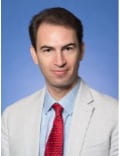 Gregg A. Brazinsky is Professor of History and International Affairs and Deputy Director of the Institute for Korean Studies at GW. He also serves as Director of the Asian Studies Program at the Elliott School of International Affairs. His research seeks to understand the diverse and multifaceted interactions among East Asian states and between Asia and the United States. He is the author of Nation Building in South Korea: Koreans, Americans, and the Making of a Democracy (University of North Carolina Press, 2007) and Winning the Third World: Sino-American Rivalry during the Cold War (University of North Carolina Press, 2017). He served as Interim Director of the GW Institute for Korean Studies during the Spring 2017 semester. He received his Ph.D. from Cornell University.
Gregg A. Brazinsky is Professor of History and International Affairs and Deputy Director of the Institute for Korean Studies at GW. He also serves as Director of the Asian Studies Program at the Elliott School of International Affairs. His research seeks to understand the diverse and multifaceted interactions among East Asian states and between Asia and the United States. He is the author of Nation Building in South Korea: Koreans, Americans, and the Making of a Democracy (University of North Carolina Press, 2007) and Winning the Third World: Sino-American Rivalry during the Cold War (University of North Carolina Press, 2017). He served as Interim Director of the GW Institute for Korean Studies during the Spring 2017 semester. He received his Ph.D. from Cornell University.
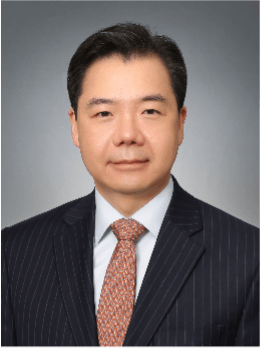 Jae-Seung Lee is Dean and Jean Monnet Chair in the Graduate School of International Studies and Division of International Studies at Korea University. He also serves as Director of the Nordic-Benelux Center and Chairman of the Asia-Europe Energy Policy Research Network (AEEPRN). As a scholar in international political economy, he has authored a number of books and articles on energy security, regional cooperation, and Korea’s foreign policy. His current research focuses on the geopolitics of energy and climate. He is affiliated with the Reischauer Center at Johns Hopkins University (SAIS) as a non-resident visiting scholar. He holds a B.A. in political science from Seoul National University, and an M.A. and Ph.D. in political science from Yale University.
Jae-Seung Lee is Dean and Jean Monnet Chair in the Graduate School of International Studies and Division of International Studies at Korea University. He also serves as Director of the Nordic-Benelux Center and Chairman of the Asia-Europe Energy Policy Research Network (AEEPRN). As a scholar in international political economy, he has authored a number of books and articles on energy security, regional cooperation, and Korea’s foreign policy. His current research focuses on the geopolitics of energy and climate. He is affiliated with the Reischauer Center at Johns Hopkins University (SAIS) as a non-resident visiting scholar. He holds a B.A. in political science from Seoul National University, and an M.A. and Ph.D. in political science from Yale University.
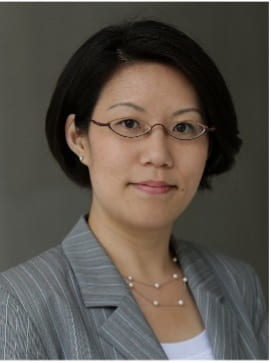 Jane Nakano is a senior fellow in the Energy Security and Climate Change Program at the Center for Strategic and International Studies (CSIS). Her research interests include U.S. energy policy; global market and policy developments concerning natural gas, nuclear energy, and critical minerals; and energy security and climate issues in the Asia-Pacific region. She frequently writes and speaks on these issues at domestic and international conferences, and to media outlets around the world. She has also testified before Congress on U.S. liquefied natural gas (LNG) exports and before the U.S.-China Economic and Security Review Commission on U.S.-China nuclear energy cooperation. Prior to joining CSIS in 2010, Nakano worked in the Office of Policy and International Affairs in the U.S. Department of Energy, where she covered a host of energy, economic, and political issues in Asia. From 2001 to 2002, she served at the U.S. embassy in Tokyo as special assistant to the energy attaché. Nakano graduated from Georgetown University’s School of Foreign Service and holds an M.A. from Columbia University’s School of International and Public Affairs.
Jane Nakano is a senior fellow in the Energy Security and Climate Change Program at the Center for Strategic and International Studies (CSIS). Her research interests include U.S. energy policy; global market and policy developments concerning natural gas, nuclear energy, and critical minerals; and energy security and climate issues in the Asia-Pacific region. She frequently writes and speaks on these issues at domestic and international conferences, and to media outlets around the world. She has also testified before Congress on U.S. liquefied natural gas (LNG) exports and before the U.S.-China Economic and Security Review Commission on U.S.-China nuclear energy cooperation. Prior to joining CSIS in 2010, Nakano worked in the Office of Policy and International Affairs in the U.S. Department of Energy, where she covered a host of energy, economic, and political issues in Asia. From 2001 to 2002, she served at the U.S. embassy in Tokyo as special assistant to the energy attaché. Nakano graduated from Georgetown University’s School of Foreign Service and holds an M.A. from Columbia University’s School of International and Public Affairs.
 Jisoo M. Kim is Korea Foundation Associate Professor of History, International Affairs, and East Asian Languages and Literatures. She currently serves as the Director of the Institute for Korean Studies and the Co-Director of the East Asia National Resource Center at GW. She also serves as the Editor-in-Chief of the Journal of Korean Studies. She is a specialist in gender, law, and emotions in Korean history. Her broader research interests include gender and sexuality, crime and justice, forensic medicine, literary representations of the law, history of emotions, vernacular, and gender writing. She is the author of The Emotions of Justice: Gender, Status, and Legal Performance in Chosŏn Korea (University of Washington Press, 2015), which was awarded the 2017 James Palais Prize of the Association for Asian Studies. She is also the co-editor of The Great East Asian War and the Birth of the Korean Nation by JaHyun Kim Haboush (Columbia University Press, 2016). She is currently working on a book project tentatively entitled Sexual Desire, Crime, and Gendered Subjects: A History of Adultery Law in Korea. She received her M.A., M.Phil., and Ph.D. in East Asian Languages and Cultures from Columbia University.
Jisoo M. Kim is Korea Foundation Associate Professor of History, International Affairs, and East Asian Languages and Literatures. She currently serves as the Director of the Institute for Korean Studies and the Co-Director of the East Asia National Resource Center at GW. She also serves as the Editor-in-Chief of the Journal of Korean Studies. She is a specialist in gender, law, and emotions in Korean history. Her broader research interests include gender and sexuality, crime and justice, forensic medicine, literary representations of the law, history of emotions, vernacular, and gender writing. She is the author of The Emotions of Justice: Gender, Status, and Legal Performance in Chosŏn Korea (University of Washington Press, 2015), which was awarded the 2017 James Palais Prize of the Association for Asian Studies. She is also the co-editor of The Great East Asian War and the Birth of the Korean Nation by JaHyun Kim Haboush (Columbia University Press, 2016). She is currently working on a book project tentatively entitled Sexual Desire, Crime, and Gendered Subjects: A History of Adultery Law in Korea. She received her M.A., M.Phil., and Ph.D. in East Asian Languages and Cultures from Columbia University.
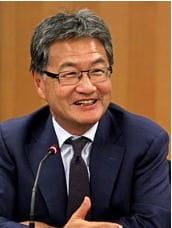 Joseph Yun, recognized as one of the nation’s leading experts on relations with North Korea, as well as on broader U.S.-East Asia policy, most recently served as Special Representative for North Korea Policy. Currently, he is Senior Advisor with The Asia Group, a DC-based strategic consulting firm, and the U.S. Institute of Peace, an independent and non-partisan federal institute working on peace and reconciliation issues throughout the globe. He is also a Global Affairs Commentator for the CNN. Yun’s 33-year diplomatic career has been marked by his commitment to face-to-face engagement as the best avenue for resolving conflict and advancing cross-border cooperation. As Special Representative on North Korea from 2016 to 2018, Ambassador Yun led U.S. efforts to align regional powers behind a united policy to denuclearize North Korea. He was instrumental in reopening the “New York channel,” a direct communication line with officials from Pyongyang. As Principal Deputy Assistant Secretary for East Asian and Pacific Affairs (2011-2013), Yun led efforts to normalize diplomatic relations with Myanmar. Yun also served as Ambassador to Malaysia (2013-16). Before joining the Foreign Service, Yun was a senior economist for Data Resources, Inc., in Lexington, Massachusetts. He holds an M.Phil. degree from the London School of Economics and a B.S. from the University of Wales.
Joseph Yun, recognized as one of the nation’s leading experts on relations with North Korea, as well as on broader U.S.-East Asia policy, most recently served as Special Representative for North Korea Policy. Currently, he is Senior Advisor with The Asia Group, a DC-based strategic consulting firm, and the U.S. Institute of Peace, an independent and non-partisan federal institute working on peace and reconciliation issues throughout the globe. He is also a Global Affairs Commentator for the CNN. Yun’s 33-year diplomatic career has been marked by his commitment to face-to-face engagement as the best avenue for resolving conflict and advancing cross-border cooperation. As Special Representative on North Korea from 2016 to 2018, Ambassador Yun led U.S. efforts to align regional powers behind a united policy to denuclearize North Korea. He was instrumental in reopening the “New York channel,” a direct communication line with officials from Pyongyang. As Principal Deputy Assistant Secretary for East Asian and Pacific Affairs (2011-2013), Yun led efforts to normalize diplomatic relations with Myanmar. Yun also served as Ambassador to Malaysia (2013-16). Before joining the Foreign Service, Yun was a senior economist for Data Resources, Inc., in Lexington, Massachusetts. He holds an M.Phil. degree from the London School of Economics and a B.S. from the University of Wales.
 Kristin Vekasi is an Associate Professor in the Department of Political Science and School of Policy and International Affairs at the University of Maine. Her research interests focus on international political economy, and the dynamics of political conflict, foreign direct investment, nationalism, and the geopolitics of supply chains. She specializes in Northeast Asia, and has spent years conducting research in China, Japan, and South Korea. Her book Risk Management Strategies of Japanese Companies in China (Routledge 2019) explores how Japanese multinational corporations mitigate political risk in China. Her current research examines how Japan, China, and the United States cooperate and compete to manage complex supply chains and infrastructure projects in Southeast Asia. Professor Vekasi received her Ph.D. in political science from the University of Wisconsin, Madison in 2014. Prior to joining the faculty at University of Maine, she taught at New College of Florida, was a visiting Research Fellow at the University of Tokyo and a Fulbright Fellow at Tohoku University. She is a member of the Mansfield Foundation’s US-Japan Network for the Future, and a National Bureau of Asian Research 2019 National Asia Research Program Fellow.
Kristin Vekasi is an Associate Professor in the Department of Political Science and School of Policy and International Affairs at the University of Maine. Her research interests focus on international political economy, and the dynamics of political conflict, foreign direct investment, nationalism, and the geopolitics of supply chains. She specializes in Northeast Asia, and has spent years conducting research in China, Japan, and South Korea. Her book Risk Management Strategies of Japanese Companies in China (Routledge 2019) explores how Japanese multinational corporations mitigate political risk in China. Her current research examines how Japan, China, and the United States cooperate and compete to manage complex supply chains and infrastructure projects in Southeast Asia. Professor Vekasi received her Ph.D. in political science from the University of Wisconsin, Madison in 2014. Prior to joining the faculty at University of Maine, she taught at New College of Florida, was a visiting Research Fellow at the University of Tokyo and a Fulbright Fellow at Tohoku University. She is a member of the Mansfield Foundation’s US-Japan Network for the Future, and a National Bureau of Asian Research 2019 National Asia Research Program Fellow.
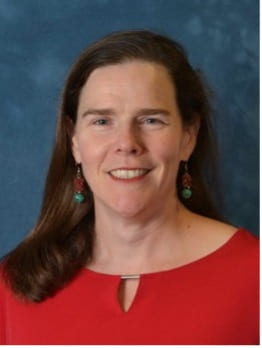 Mary Alice Haddad is the John E. Andrus Professor of Government, Director of the Office for Faculty and Career Development, Chair of the College of East Asian Studies, and Professor of Environmental Studies at Wesleyan University. She has published three books, Effective Advocacy: Lessons from East Asia’s Environmentalists (MIT, 2021), Building Democracy in Japan (Cambridge, 2012), Politics and Volunteering in Japan: A Global Perspective (Cambridge, 2007), and co-edited two more Greening East Asia: The Rise of the Eco-Developmental State co-edited with Ashley Esarey, Joanna Lewis, and Stevan Harrell (University of Washington Press, 2020), and NIMBY is Beautiful: Cases of Local Activism and Environmental Innovation Around the World, co-edited with Carol Hager (Berghahn Books, 2015). Her articles have appeared in journals such as Comparative Political Studies, Democratization, Journal of Asian Studies, and Nonprofit and Voluntary Sector Quarterly. She has received numerous grants and fellowships from organizations such as the Institute of International Education (Fulbright), the Harvard Academy for International and Area Studies, the Japan Foundation, National Endowment for the Humanities, Mellon Foundation, Maureen and Mike Mansfield Foundation, and the East Asian Institute. Her current work examines the role of urban diplomacy in solving global problems and transforming international relations.
Mary Alice Haddad is the John E. Andrus Professor of Government, Director of the Office for Faculty and Career Development, Chair of the College of East Asian Studies, and Professor of Environmental Studies at Wesleyan University. She has published three books, Effective Advocacy: Lessons from East Asia’s Environmentalists (MIT, 2021), Building Democracy in Japan (Cambridge, 2012), Politics and Volunteering in Japan: A Global Perspective (Cambridge, 2007), and co-edited two more Greening East Asia: The Rise of the Eco-Developmental State co-edited with Ashley Esarey, Joanna Lewis, and Stevan Harrell (University of Washington Press, 2020), and NIMBY is Beautiful: Cases of Local Activism and Environmental Innovation Around the World, co-edited with Carol Hager (Berghahn Books, 2015). Her articles have appeared in journals such as Comparative Political Studies, Democratization, Journal of Asian Studies, and Nonprofit and Voluntary Sector Quarterly. She has received numerous grants and fellowships from organizations such as the Institute of International Education (Fulbright), the Harvard Academy for International and Area Studies, the Japan Foundation, National Endowment for the Humanities, Mellon Foundation, Maureen and Mike Mansfield Foundation, and the East Asian Institute. Her current work examines the role of urban diplomacy in solving global problems and transforming international relations.
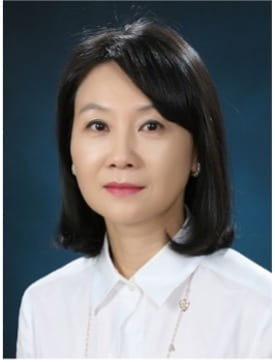 Shin-wha Lee is a Professor in the Department of Political Science and International Relations and Director of Peace and Democracy Institute at Korea University. She serves as President of Korean Academic Council on the United Nations System, a member of Korean Committee on Public Diplomacy, and a member of Trilateral Commission. She received her Ph.D. from University of Maryland at College Park. Her previous positions include a post-doctoral fellow at Harvard University’s Center for International Affairs, Special advisor to UNSG Kofi Annan’s Rwandan Independent Inquiry, Chair’s advisor of East Asian Vision Group, full-time visiting professor at Columbia University, executive committee member of Academic Council on the UN Studies, visiting scholar at MIT’s Center for International Studies, and UN Secretary General’s Advisory Group Member of Peacebuilding Fund. Her numerous publications cover human security, international organizations, East Asian multilateral security and foreign policies.
Shin-wha Lee is a Professor in the Department of Political Science and International Relations and Director of Peace and Democracy Institute at Korea University. She serves as President of Korean Academic Council on the United Nations System, a member of Korean Committee on Public Diplomacy, and a member of Trilateral Commission. She received her Ph.D. from University of Maryland at College Park. Her previous positions include a post-doctoral fellow at Harvard University’s Center for International Affairs, Special advisor to UNSG Kofi Annan’s Rwandan Independent Inquiry, Chair’s advisor of East Asian Vision Group, full-time visiting professor at Columbia University, executive committee member of Academic Council on the UN Studies, visiting scholar at MIT’s Center for International Studies, and UN Secretary General’s Advisory Group Member of Peacebuilding Fund. Her numerous publications cover human security, international organizations, East Asian multilateral security and foreign policies.
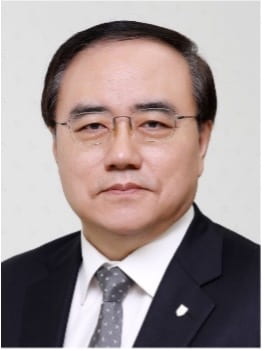 Sung-han Kim is Professor of International Relations at the Graduate School of International Studies (GSIS) and Division of International Studies (DIS) and Director of Ilmin International Relations Institute at Korea University. He was Dean of GSIS and DIS from 2017 to 2021. He served as a Vice Minister of Foreign Affairs and Trade in the Ministry of Foreign Affairs and Trade in 2012-2013. He was a professor from 1994 to 2007 at the Institute of Foreign Affairs and National Security (IFANS) in the Ministry of Foreign Affairs and Trade. In 2013-2014, Dr. Kim was the Chair of World Economic Forum’s Global Agenda Council on WMD. He provided his commitment as the President of the Korean National Committee of CSCAP (Council on Security Cooperation in the Asia Pacific); Vice President of the Korean Association of International Studies; President of the Korean Association of American Politics (KAAP); and Chairman of the Vision Council for the ROK-U.S. Security Policy Initiative. After the North Korean military attack on the Cheonan naval corvette in March 2010, he served as a member of the Presidential Commission for National Security Review (May – August 2010) and the Presidential Commission for Defense Reform (July – December 2010). He received his Ph.D. in Political Science from the University of Texas at Austin. His recent articles contributed to scholarly journals include “Denuclearizing North Korea: Time for Plan B?”, “From Blood Alliance to Strategic Alliance,” “The End of Humanitarian Intervention?” and “The Day After: ROK-U.S. Cooperation for Korean Unification.”
Sung-han Kim is Professor of International Relations at the Graduate School of International Studies (GSIS) and Division of International Studies (DIS) and Director of Ilmin International Relations Institute at Korea University. He was Dean of GSIS and DIS from 2017 to 2021. He served as a Vice Minister of Foreign Affairs and Trade in the Ministry of Foreign Affairs and Trade in 2012-2013. He was a professor from 1994 to 2007 at the Institute of Foreign Affairs and National Security (IFANS) in the Ministry of Foreign Affairs and Trade. In 2013-2014, Dr. Kim was the Chair of World Economic Forum’s Global Agenda Council on WMD. He provided his commitment as the President of the Korean National Committee of CSCAP (Council on Security Cooperation in the Asia Pacific); Vice President of the Korean Association of International Studies; President of the Korean Association of American Politics (KAAP); and Chairman of the Vision Council for the ROK-U.S. Security Policy Initiative. After the North Korean military attack on the Cheonan naval corvette in March 2010, he served as a member of the Presidential Commission for National Security Review (May – August 2010) and the Presidential Commission for Defense Reform (July – December 2010). He received his Ph.D. in Political Science from the University of Texas at Austin. His recent articles contributed to scholarly journals include “Denuclearizing North Korea: Time for Plan B?”, “From Blood Alliance to Strategic Alliance,” “The End of Humanitarian Intervention?” and “The Day After: ROK-U.S. Cooperation for Korean Unification.”
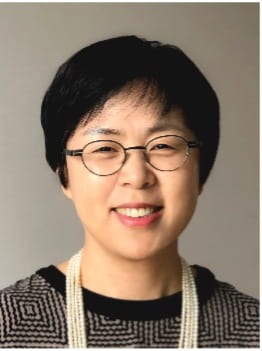 YoungJa Bae is a Professor in the Department of Political Science and Diplomacy at Konkuk University. Dr. Bae received her Ph.D. in political science at University of North Carolina at Chapel Hill and serves on the policy advisory committee to the South Korean Ministry of Foreign Affairs and vice chairman of the Korean Association of International Studies. She was a visiting scholar at National Taiwan University under Taiwan Fellowship. Her main research interests include international politics and S&T, science diplomacy, and international political economy. Her major papers include “Regulations on Foreign Direct Investment and National Security,” “US-China competition and Science and Technology Innovation,” and “S&T Diplomacy as Public Diplomacy: Theoretical Understanding.”
YoungJa Bae is a Professor in the Department of Political Science and Diplomacy at Konkuk University. Dr. Bae received her Ph.D. in political science at University of North Carolina at Chapel Hill and serves on the policy advisory committee to the South Korean Ministry of Foreign Affairs and vice chairman of the Korean Association of International Studies. She was a visiting scholar at National Taiwan University under Taiwan Fellowship. Her main research interests include international politics and S&T, science diplomacy, and international political economy. Her major papers include “Regulations on Foreign Direct Investment and National Security,” “US-China competition and Science and Technology Innovation,” and “S&T Diplomacy as Public Diplomacy: Theoretical Understanding.”
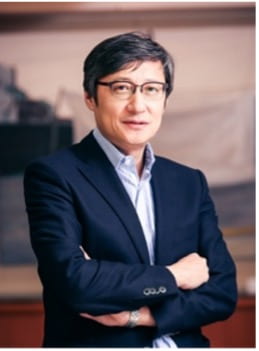 Yul Sohn is the President of the East Asia Institute (EAI) and Professor of the Graduate School of International Studies (GSIS) and Underwood International College at Yonsei University, Seoul, Korea. Sohn served as President of the Korean Association of International Studies (KAIS) in 2019. He also served as Dean of the GSIS (2012-2016) and President of the Association for Contemporary Japanese Studies (2012). Before joining the faculty at Yonsei, Sohn taught at Chung-Ang University, and was a visiting scholar at institutions in the University of Tokyo, Waseda University, the University of North Carolina, Chapel Hill, and the University of California, Berkeley. Sohn has served as a policy advisor on a number of government advisory committees including the Ministry of Foreign Affairs, the Ministry of Trade, the Korea National Diplomatic Academy, the Northeast Asian History Foundation and the Korea Foundation. Sohn has written extensively on Japanese and East Asian political economy, East Asian international relations, and public diplomacy. His most recent publications include Japan and Asia’s Contested Order (2019, with T. J. Pempel) and Understanding Public Diplomacy in East Asia (2016, with Jan Melissen) both from Palgrave MacMillan, and “South Korea under US-China Rivalry: The Dynamics of the Economic-Security Nexus in the Trade Policymaking,” The Pacific Review (2019), 32, 6. Sohn received his Ph.D. in Political Science from the University of Chicago, Illinois.
Yul Sohn is the President of the East Asia Institute (EAI) and Professor of the Graduate School of International Studies (GSIS) and Underwood International College at Yonsei University, Seoul, Korea. Sohn served as President of the Korean Association of International Studies (KAIS) in 2019. He also served as Dean of the GSIS (2012-2016) and President of the Association for Contemporary Japanese Studies (2012). Before joining the faculty at Yonsei, Sohn taught at Chung-Ang University, and was a visiting scholar at institutions in the University of Tokyo, Waseda University, the University of North Carolina, Chapel Hill, and the University of California, Berkeley. Sohn has served as a policy advisor on a number of government advisory committees including the Ministry of Foreign Affairs, the Ministry of Trade, the Korea National Diplomatic Academy, the Northeast Asian History Foundation and the Korea Foundation. Sohn has written extensively on Japanese and East Asian political economy, East Asian international relations, and public diplomacy. His most recent publications include Japan and Asia’s Contested Order (2019, with T. J. Pempel) and Understanding Public Diplomacy in East Asia (2016, with Jan Melissen) both from Palgrave MacMillan, and “South Korea under US-China Rivalry: The Dynamics of the Economic-Security Nexus in the Trade Policymaking,” The Pacific Review (2019), 32, 6. Sohn received his Ph.D. in Political Science from the University of Chicago, Illinois.
Moderators
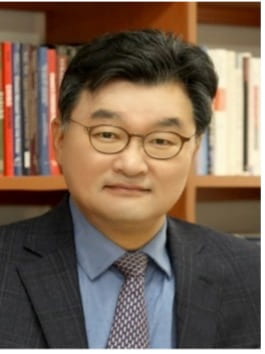 Heung-Kyu Kim is the founder and Director of U.S.-China Policy Institute and professor in the Department of Political Science at Ajou University. He also served as a professor at the Institute of Foreign Affairs and National Security in South Korea’s Ministry of Foreign Affairs. His current assignments include Policy Advisory Board Member for the Ministry of National Defense and ROK Army and Chairman of the Foreign Ministry’s Reform Commission. He also served as Director of Foreign Affairs Subcommittee on the Presidential Commission on Policy Planning, Team Leader of Security and Defense in the Presidential Task Force of Future Vision 2045, a board member of the National Security Council and a board member of National Defense Reform Commission. Dr. Kim’s publications include China and the U.S.-ROK Alliance: Promoting a Trilateral Dialogue (CFR, 2017), Enemy, Homager or Equal Partner?: Evolving Korea-China Relations (2012), From a Buffer Zone to a Strategic Burden: Evolving Sino-North Korea Relations during Hu Jintao Era (2010). His book China’s Central-Local Relations and Decision-Making received an award for Excellency of the Year by the Ministry of Culture in 2008. He also received the NEAR Foundation Academic prize of the year in the area of foreign policy and security in 2014. Kim received his BA and MA in international relations from Seoul National University and Ph.D. in Political Science from the University of Michigan.
Heung-Kyu Kim is the founder and Director of U.S.-China Policy Institute and professor in the Department of Political Science at Ajou University. He also served as a professor at the Institute of Foreign Affairs and National Security in South Korea’s Ministry of Foreign Affairs. His current assignments include Policy Advisory Board Member for the Ministry of National Defense and ROK Army and Chairman of the Foreign Ministry’s Reform Commission. He also served as Director of Foreign Affairs Subcommittee on the Presidential Commission on Policy Planning, Team Leader of Security and Defense in the Presidential Task Force of Future Vision 2045, a board member of the National Security Council and a board member of National Defense Reform Commission. Dr. Kim’s publications include China and the U.S.-ROK Alliance: Promoting a Trilateral Dialogue (CFR, 2017), Enemy, Homager or Equal Partner?: Evolving Korea-China Relations (2012), From a Buffer Zone to a Strategic Burden: Evolving Sino-North Korea Relations during Hu Jintao Era (2010). His book China’s Central-Local Relations and Decision-Making received an award for Excellency of the Year by the Ministry of Culture in 2008. He also received the NEAR Foundation Academic prize of the year in the area of foreign policy and security in 2014. Kim received his BA and MA in international relations from Seoul National University and Ph.D. in Political Science from the University of Michigan.
 Yonho Kim is an Associate Research Professor of Practice and the Associate Director of GW Institute for Korean Studies. He specializes in North Korea’s mobile telecommunications and U.S. policy towards North Korea. Kim is the author of North Korean Phone Money: Airtime Transfers as a Precursor to Mobile Payment System (2020), North Korea’s Mobile Telecommunications and Private Transportation Services in the Kim Jong-un Era (2019) and Cell Phones in North Korea: Has North Korea Entered the Telecommunications Revolution? (2014). His research findings were covered by various media outlets, including Wall Street Journal, The Atlantic, Yonhap News, and Libération. Prior to joining GWIKS, he extensively interacted with the Washington policy circle on the Korean peninsula as Senior Researcher of the U.S.-Korea Institute at Johns Hopkins University School of Advanced International Studies, Senior Reporter for Voice of America’s Korean Service, and Assistant Director of the Atlantic Council’s Program on Korea in Transition. He holds a B.A. and M.A. in International Relations from Seoul National University, and an M.A. in International Relations and International Economics from Johns Hopkins University School of Advanced International Studies.
Yonho Kim is an Associate Research Professor of Practice and the Associate Director of GW Institute for Korean Studies. He specializes in North Korea’s mobile telecommunications and U.S. policy towards North Korea. Kim is the author of North Korean Phone Money: Airtime Transfers as a Precursor to Mobile Payment System (2020), North Korea’s Mobile Telecommunications and Private Transportation Services in the Kim Jong-un Era (2019) and Cell Phones in North Korea: Has North Korea Entered the Telecommunications Revolution? (2014). His research findings were covered by various media outlets, including Wall Street Journal, The Atlantic, Yonhap News, and Libération. Prior to joining GWIKS, he extensively interacted with the Washington policy circle on the Korean peninsula as Senior Researcher of the U.S.-Korea Institute at Johns Hopkins University School of Advanced International Studies, Senior Reporter for Voice of America’s Korean Service, and Assistant Director of the Atlantic Council’s Program on Korea in Transition. He holds a B.A. and M.A. in International Relations from Seoul National University, and an M.A. in International Relations and International Economics from Johns Hopkins University School of Advanced International Studies.
Third Annual GW-IU Undergraduate Research Exchange Conference
10/26 GWIKS Interview Series with Wendy Cutler (ESIA BA ’79)
The GW Institute for Korean Studies Presents:
GWIKS Interview Series with Wendy Cutler (ESIA BA ’79)
Speaker: Wendy Cutler (ESIA BA ’79)
Monday, October 26, 2020
2:00 PM – 2:40 PM EDT
Virtual Event
This event is on the record and open to the public.
Event Description
Please join the GW Institute for Korean Studies (GWIKS) for a live interview with Wendy Cutler, Vice President of the Asia Society Policy Institute (ASPI). This event is part of our interview series with prominent GW alumni working in the policy fields. As a former top U.S. trade negotiator, Wendy Cutler will provide her views on the new challenges for trade and investment in the Asia-Pacific region. She will also share the highlights of her days at GW and provide career advice to students.
Speaker
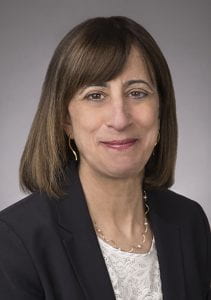 Wendy Cutler (ESIA BA ’79) joined the Asia Society Policy Institute (ASPI) as vice president in November 2015. She also serves as the managing director of the Washington D.C. Office. In these roles, she focuses on building ASPI’s presence in Washington — strengthening its outreach as a think/do tank — and on leading initiatives that address challenges related to trade and investment, as well as women’s empowerment in Asia. She joined ASPI following an illustrious career of nearly three decades as a diplomat and negotiator in the Office of the U.S. Trade Representative (USTR). Most recently she served as Acting Deputy U.S. Trade Representative, working on a range of U.S. trade negotiations and initiatives in the Asia-Pacific region. In that capacity she was responsible for the Trans-Pacific Partnership (TPP) agreement, including the bilateral negotiations with Japan. She also was the chief negotiator to the U.S.-Korea (KORUS) Free Trade Agreement.
Wendy Cutler (ESIA BA ’79) joined the Asia Society Policy Institute (ASPI) as vice president in November 2015. She also serves as the managing director of the Washington D.C. Office. In these roles, she focuses on building ASPI’s presence in Washington — strengthening its outreach as a think/do tank — and on leading initiatives that address challenges related to trade and investment, as well as women’s empowerment in Asia. She joined ASPI following an illustrious career of nearly three decades as a diplomat and negotiator in the Office of the U.S. Trade Representative (USTR). Most recently she served as Acting Deputy U.S. Trade Representative, working on a range of U.S. trade negotiations and initiatives in the Asia-Pacific region. In that capacity she was responsible for the Trans-Pacific Partnership (TPP) agreement, including the bilateral negotiations with Japan. She also was the chief negotiator to the U.S.-Korea (KORUS) Free Trade Agreement.
Moderator
 Yonho Kim is Associate Research Professor of Practice and Associate Director of GW Institute for Korean Studies. He specializes in North Korea’s mobile telecommunications and U.S. policy towards North Korea. Kim is the author of North Korean Phone Money: Airtime Transfers as a Precursor to Mobile Payment System (2020), North Korea’s Mobile Telecommunications and Private Transportation Services in the Kim Jong-un Era (2019), and Cell Phones in North Korea: Has North Korea Entered the Telecommunications Revolution? (2014). His research findings were covered by various media outlets, including Wall Street Journal, The Atlantic, Yonhap News, and Libération. Prior to joining GWIKS, he extensively interacted with the Washington policy circle on the Korean peninsula as Senior Researcher of the US-Korea Institute at Johns Hopkins University School of Advanced International Studies, Senior Reporter for Voice of America’s Korean Service, and Assistant Director of the Atlantic Council’s Program on Korea in Transition. He holds a B.A. and M.A. in International Relations from Seoul National University, and an M.A. in International Relations and International Economics from Johns Hopkins University School of Advanced International Studies.
Yonho Kim is Associate Research Professor of Practice and Associate Director of GW Institute for Korean Studies. He specializes in North Korea’s mobile telecommunications and U.S. policy towards North Korea. Kim is the author of North Korean Phone Money: Airtime Transfers as a Precursor to Mobile Payment System (2020), North Korea’s Mobile Telecommunications and Private Transportation Services in the Kim Jong-un Era (2019), and Cell Phones in North Korea: Has North Korea Entered the Telecommunications Revolution? (2014). His research findings were covered by various media outlets, including Wall Street Journal, The Atlantic, Yonhap News, and Libération. Prior to joining GWIKS, he extensively interacted with the Washington policy circle on the Korean peninsula as Senior Researcher of the US-Korea Institute at Johns Hopkins University School of Advanced International Studies, Senior Reporter for Voice of America’s Korean Service, and Assistant Director of the Atlantic Council’s Program on Korea in Transition. He holds a B.A. and M.A. in International Relations from Seoul National University, and an M.A. in International Relations and International Economics from Johns Hopkins University School of Advanced International Studies.
9/22 Roundtable Discussions: U.S.-Korea Relations in the Era of U.S.-China Strategic Rivalry
The GW Institute for Korean Studies, the GW East Asia National Resource Center, and Ajou University US-China Policy Institute Present:
Korea Policy Forum
Virtual Roundtable Discussions:
U.S.-Korea Relations in the Era of U.S.-China Strategic Rivalry
Tuesday, September 22, 2020
8:30 a.m. – 10:30 a.m. (EDT)
9:30 p.m. – 11:30 p.m. (KST)
Livestream via Zoom
This event is on the record and open to the public.
Event Description
The intensifying strategic rivalry between the U.S. and China under the Trump administration has exposed the U.S.-Korea relations to a greater deal of uncertainty. With China’s economic rise and assertive diplomatic posture, this new strategic shock could last in the coming years regardless of the results of the U.S. presidential election this year. What are the challenges and opportunities that should be identified by the decades-old allies? What are the necessary steps that Seoul and Washington should take to reduce the strategic risks in the coming months and years? Please join the GW Institute for Korean Studies for an online roundtable discussion with experts from both the U.S. and South Korea on Washington and Seoul’s strategic thinking and priorities in Northeast Asia.
Roundtable Participants (Alphabetical Order)
(1) South Korea
Beomchul Shin (Director of Diplomacy and Security Center, Korea Research Institute for National Strategy)
Byung-Yeon Kim (Professor in the Department of Economics, Seoul National University)
Chaesung Chun (Professor in the Department of Political Science and International Relations, Seoul National University)
Heung-Kyu Kim (Director of U.S.-China Policy Institute, Ajou University)
Sang Hyun Lee (Senior Research Fellow, Sejong Institute)
Sung-Han Kim (Dean of the Graduate School of International Studies, Korea University)
Wang Hwi Lee (Professor in the Division of International Studies, Ajou University)
(2) The United States
Elbridge Colby (Co-Founder and Principal, The Marathon Initiative)
Eric Sayers (Vice President, Beacon Global Strategies)
John Fleming (Senior Director for Strategic Projects, Owl Cyber Defense Solutions)
Jung Pak (SK-Korea Foundation Chair in Korea Studies, Brookings Institution)
Scott Snyder (Director of the Program on U.S.-Korea policy, Council on Foreign Relations)
William Brown (Principal, Northeast Asia Economics and Intelligence Advisory)
Yonho Kim (Associate Director, GW Institute for Korean Studies)
Program
The Korea Policy Forum is made possible by a generous grant provided by the KDI School of Public Policy and Management.
10/28 U.S.-ROK-Japan Trilateral Relations in the Post-Abe Era
Wednesday, October 28, 2020
10:00 AM – 11:30 AM EDT
Virtual Event
This event is on the record and open to the public.
Event Description
Japan’s new Prime Minister Yoshihide Suga inherited ongoing challenges for the U.S.-South Korean-Japanese trilateral relations from his predecessor Shinzo Abe. Although both Tokyo and Seoul are not willing to change their existing policy lines in the short-run, the political need for a refreshed approach to Korea-Japan relations would emerge as both countries struggle with the unprecedented challenges in the COVID-19 pandemic and wait for the results of the U.S. elections in November. Please join GW Institute for Korean Studies for an online discussion on the trilateral relations in the post-Abe era. The speakers will discuss prospects of the civil society activism on the Korean Supreme Court’s ruling, Korea and Japan’s domestic politics and the trilateral relations and a U.S. view of the trilateral relations.
Speakers (Alphabetical Order)
Celeste Arrington (left) is Korea Foundation Associate Professor of Political Science and International Affairs at GW. She specializes in comparative politics, with a regional focus on the Koreas and Japan. Her research and teaching focus on law and social movements, the media, lawyers, policy processes, historical justice, North Korean human rights, and qualitative methods. She is also interested in the international relations and security of Northeast Asia and transnational activism. She is the author of Accidental Activists: Victims and Government Accountability in South Korea and Japan (2016) and has published in Comparative Political Studies, Law & Society Review, Journal of East Asian Studies, Pacific Affairs, Asian Survey, and the Washington Post, among others. She received a Ph.D. from the University of California, Berkeley, an MPhil from the University of Cambridge, and an A.B. from Princeton University. She is currently writing a book that analyzes the role of lawyers and legal activism in Japanese and Korean policies related to persons with disabilities and tobacco control.
Emma Chanlett-Avery (second to left) is a Specialist in Asian Affairs at the Congressional Research Service. She focuses on U.S. relations with Japan, the Korean Peninsula, Thailand, and Singapore. Ms. Chanlett-Avery joined CRS in 2003 through the Presidential Management Fellowship, with rotations in the State Department on the Korea Desk and at the Joint U.S. Military Advisory Group in Bangkok, Thailand. She also worked in the Office of Policy Planning as a Harold Rosenthal Fellow. She is a member of the Mansfield Foundation U.S. – Japan Network for the Future, Vice-Chair of the Board of Trustees of the Japan America Society of Washington, and the 2016 recipient of the Kato Prize. Ms. Chanlett-Avery received an MA in international security policy from the School of International and Public Affairs at Columbia University and her BA in Russian studies from Amherst College.
James L. Schoff (second to right) is a senior fellow in the Carnegie Asia Program. His research focuses on U.S.-Japan relations and regional engagement, East Asian security, and alliance collaboration in high-tech fields. Before joining Carnegie in 2012, Schoff served as senior adviser for East Asia policy at the U.S. Office of the Secretary of Defense, where he was responsible for strategic planning and policy development for relations with Japan and the Republic of Korea. He also spearheaded extended deterrence dialogues and contributed to trilateral security cooperation initiatives. Before then he served as director of Asia Pacific Studies at the Institute for Foreign Policy Analysis in Cambridge, Massachusetts. Schoff’s publications include “U.S.-Japan Technology Policy Coordination: Balancing Technonationalism with a Globalized World” (Carnegie, 2020), Uncommon Alliance for the Common Good: The United States and Japan after the Cold War (Carnegie, 2017), and Tools for Trilateralism: Improving U.S.-Japan-Korea Cooperation to Manage Complex Contingencies (Potomac Books Inc., 2005). Schoff earned a Masters Degree from Johns Hopkins’ School of Advanced International Studies (SAIS) and a Bachelors Degree in Japanese history from Duke University (including a year at International Christian University in Japan).
Yong-Chool Ha (right), a Russia and Korea specialist, is Korea Foundation Professor at the Jackson School of International Studies, University of Washington. He is Professor emeritus of Seoul National University. He visited North Korea three times and has written on North Korea, South Korea, East Asia and Russian foreign policy. Beyond writings on international issues, he has a broader academic interest in comparative study of late industrialization and social change. His research interests are community building and international relations theories, late industrialization and international relations, and changing elite-mass relations in late industrializing countries. Currently he is finishing a book on “Late Industrialization, the State and Social Change in a Comparative Perspective.”His recent publications include: The Dynamics of Strong State (SNU Press, 2006), Late Industrialization, the State and Tradition: the Emergence of Neofamilism in Korea (2007, CPS), Colonial Social Change (ed.)(U. of Washington Press, 2013), and The International Impact of the Colonial Rule in Korea (UW Press, 2019).
Moderator
Yonho Kim is Associate Research Professor of Practice and Associate Director of GW Institute for Korean Studies. He specializes in North Korea’s mobile telecommunications and U.S. policy towards North Korea. Kim is the author of North Korean Phone Money: Airtime Transfers as a Precursor to Mobile Payment System (2020), North Korea’s Mobile Telecommunications and Private Transportation Services in the Kim Jong-un Era (2019) and Cell Phones in North Korea: Has North Korea Entered the Telecommunications Revolution? (2014). His research findings were covered by various media outlets, including Wall Street Journal, The Atlantic, Yonhap News, and Libération. Prior to joining GWIKS, he extensively interacted with the Washington policy circle on the Korean peninsula as Senior Researcher of the U.S.-Korea Institute at Johns Hopkins University School of Advanced International Studies, Senior Reporter for Voice of America’s Korean Service, and Assistant Director of the Atlantic Council’s Program on Korea in Transition. He holds a B.A. and M.A. in International Relations from Seoul National University, and an M.A. in International Relations and International Economics from Johns Hopkins University School of Advanced International Studies.
10/30 Cold War Cosmopolitanism: Period Style in 1950s Korean Cinema
Soh Jaipil Lecture Series
Speaker
Christina Klein, Associate Professor of English and Director of American Studies, Boston College
Moderator
Immanuel Kim, Korea Foundation and Kim-Renaud Associate Professor of Korean Literature and Culture Studies,
the George Washington University
Date&Time
Friday, October 30, 2020
2:00 p.m. – 3:30 p.m.
Virtual Event
Event Description
South Korea in the 1950s was home to a burgeoning film culture, one of the many “Golden Age cinemas” that flourished in Asia during the postwar years. Cold War Cosmopolitanism offers a transnational cultural history of South Korean film style in this period, focusing on the works of Han Hyung-mo, director of the era’s most glamorous and popular women’s pictures, including the blockbuster Madame Freedom (1956). Christina Klein provides a unique approach to the study of film style, illuminating how Han’s films took shape within a “free world” network of aesthetic and material ties created by the legacies of Japanese colonialism, the construction of US military bases, the waging of the cultural Cold War, the forging of regional political alliances, and the import of popular cultures from around the world.
Speaker
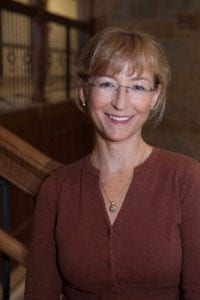 Christina Klein holds a BA in Film Studies from Wesleyan and Ph.D. in American Studies from Yale. In addition to her new book, Cold War Cosmopolitanism, which was just published by the University of California Press, she is the author of Cold War Orientalism: Asia in the Middlebrow Imagination, 1945-1961 (California, 2003). Her articles on Korean and other Asian cinemas have been published in The Journal of Korean Studies, Transnational Cinemas, American Quarterly, Journal of Chinese Cinemas, Comparative American Studies, and Cinema Journal. She teaches film, English, and American Studies at Boston College.
Christina Klein holds a BA in Film Studies from Wesleyan and Ph.D. in American Studies from Yale. In addition to her new book, Cold War Cosmopolitanism, which was just published by the University of California Press, she is the author of Cold War Orientalism: Asia in the Middlebrow Imagination, 1945-1961 (California, 2003). Her articles on Korean and other Asian cinemas have been published in The Journal of Korean Studies, Transnational Cinemas, American Quarterly, Journal of Chinese Cinemas, Comparative American Studies, and Cinema Journal. She teaches film, English, and American Studies at Boston College.
Moderator
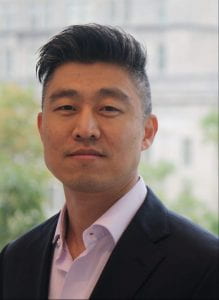 Immanuel Kim is Korea Foundation and Kim-Renaud Associate Professor of Korean Literature and Culture Studies. Prior to working at the George Washington University, he was Assistant Professor in the Department of Asian and Asian American Studies at Binghamton University (SUNY). Dr. Kim received his Ph.D. from the University of California, Riverside. He is an authority on North Korean literature and film and is the author of a recent book on North Korean literature, Rewriting Revolution: Women, Sexuality, and Memory in North Korean Fiction (University of Hawaii Press, 2018).
Immanuel Kim is Korea Foundation and Kim-Renaud Associate Professor of Korean Literature and Culture Studies. Prior to working at the George Washington University, he was Assistant Professor in the Department of Asian and Asian American Studies at Binghamton University (SUNY). Dr. Kim received his Ph.D. from the University of California, Riverside. He is an authority on North Korean literature and film and is the author of a recent book on North Korean literature, Rewriting Revolution: Women, Sexuality, and Memory in North Korean Fiction (University of Hawaii Press, 2018).

9/3 Korea Policy Forum: Security on the Korean Peninsula and the U.S.-ROK Relations
Thursday, September 3, 2020
10:00 a.m. – 11:00 a.m. ET
Livestream via Zoom
If you have a question for Ambassador Lee, please submit it when you complete the guest registration. Registered guests will receive Eventbrite confirmation email with details for joining the virtual event. This event is on the record and open to the public.
Event Description
During the last seventy years, the bilateral relationship between the Republic of Korea and the United States of America has been a lynchpin through which peace and stability has been maintained in Northeast Asia. A relationship that was originally a military alliance has evolved to become a partnership incorporating political, economic, and cultural cooperation as well.
The ongoing pandemic has proven to be another area where the partnership has demonstrated real results, as both country’s governments and businesses have undertaken new measures to cooperate in areas related to health and welfare and worked to reinvigorate bilateral trade.
Please join us for an online discussion with Soo Hyuck Lee, the Korean Ambassador to the United States, as he looks back on the evolution of seventy years of bilateral cooperation and examines what lies ahead for the relationship’s next seventy years.
Speaker
Soo Hyuck Lee, Ambassador of the Republic of Korea to the U.S.
An experienced Diplomat and former Legislator, Ambassador Lee has served as Korean Ambassador Extraordinary and Plenipotentiary to the United States since October 2019. Prior to his appointment, Ambassador Lee served as a Member of the 20th Korean National Assembly, where he was a member of the Foreign Affairs and Unification Committee, an Endowed Chair Professor at Dankook University in Seoul and First Deputy Director of the National Intelligence Service. He was previously the Ambassador to Germany, Deputy Minister for Political Affairs at the Ministry of Foreign Affairs and Trade, Ambassador to the Federal Republic of Yugoslavia, and Minister Counselor at the Korean Embassy in the United States. Ambassador Lee has published multiple works, including Conversations with Unified Germany (2006), Transforming Events – Analysis of North Korea’s Nuclear Issues (2008) and North Korea is a Reality (2011). He has twice been awarded the Order of Service Merit. He received his BA in International Relations from Seoul National University and MA in Political Science from Yonsei University. He is married with two sons.
Moderator

Jisoo M. Kim, Director, GW Institute for Korean Studies
Jisoo M. Kim is Korea Foundation Associate Professor of History, International Affairs, and East Asian Languages and Literatures and Director of the Institute for Korean Studies at GW. She received her Ph.D. in Korean History from Columbia University. She is a specialist in gender and legal history of early modern Korea. Her broader research interests include gender and sexuality, crime and justice, forensic medicine, literary representations of the law, history of emotions, vernacular, and gender writing. She is the author of The Emotions of Justice: Gender, Status, and Legal Performance in Chosŏn Korea (University of Washington Press, 2015), which was awarded the 2017 James Palais Prize of the Association for Asian Studies. She is also the co-editor of The Great East Asian War and the Birth of the Korean Nation by JaHyun Kim Haboush (Columbia University Press, 2016). She is currently working on two book projects titled Suspicious Deaths: Forensic Medicine, Dead Bodies, and Criminal Justice in Chosŏn Korea and Sexual Desire and Gendered Subjects: Decriminalization of Adultery Law in Korean History.
The Korea Policy Forum is made possible by a generous grant provided by the KDI School of Public Policy and Management.
12/09 Korea Policy Forum Virtual Roundtable Discussion: Prospects for U.S.-China Strategic Rivalry and U.S.-ROK Relations under the Biden Administration
Wednesday, December 9th, 2020
9:00 a.m. – 11:00 a.m. Eastern Time
11:00 p.m. – 1:00 a.m. Korean Standard Time
Virtual Event via Zoom
This event is on the record and open to the public.
Event Description
The intensifying strategic rivalry between the U.S. and China under the Trump administration has exposed the U.S.-ROK relationship to a greater deal of uncertainty. South Korea saw both challenges and opportunities in President Trump’s top-down approach toward addressing the North Korean nuclear issue. The prolonged stalemate over U.S.-ROK defense cost-sharing negotiations raised questions about the characteristics of the decades-old alliance. President-Elect Joseph Biden has signaled supporting shifts in how the U.S. conducts its relations with China and South Korea. What are the foreign policy challenges and opportunities that face the incoming Biden administration, and what is in store in the near future for U.S.-China and U.S.-ROK relations? What are the necessary steps that Seoul and Washington should take to reduce the strategic risks in the coming months and years? Please join the GW Institute for Korean Studies for an online roundtable discussion with experts from both the U.S. and South Korea on prospects for the geopolitical dynamics in Northeast Asia under the new U.S. administration.
Roundtable Participants
South Korea
- Beomchul Shin (Director, Diplomacy and Security Center, Korea Research Institute for National Strategy)
- Byung-Yeon Kim (Professor, Department of Economics, Seoul National University)
- Jina Kim (Research Fellow, Korea Institute of Defense Analyses)
- Heung-Kyu Kim (Director, U.S.-China Policy Institute, Ajou University)
- Sang Hyun Lee (Senior Research Fellow, Sejong Institute)
- Wang-hwi Lee (Professor, Division of International Studies, Ajou University)
- Young-kwan Yoon (Professor Emeritus, Department of Political Science and International Relations, Seoul National University, Former Minister of Foreign Affairs)
The United States
- Frank Jannuzi (President and Chief Executive Officer, Maureen and Mike Mansfield Foundation)
- Joseph DeTrani (Former U.S. Special Envoy for the Six-Party Talks with North Korea)
- Joseph Yun (Senior Advisor, U.S. Institute of Peace, Former U.S. Special Representative for North Korea Policy)
- Mark Tokola (Vice President, Korea Economic Institute of America)
- Sharon Squassoni (Research Professor, Elliott School of International Affairs, The George Washington University)
- Sheena Chestnut Greitens (Associate Professor, LBJ School of Public Affairs, University of Texas at Austin)
- Yonho Kim (Associate Director, GW Institute for Korean Studies)
The Korea Policy Forum is made possible by a generous grant provided by the KDI School of Public Policy and Management.






